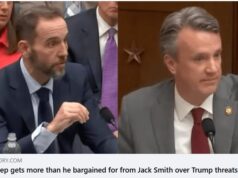How well have summer (post-primary, so mostly July/August) polls predicted final results in Virginia gubernatorial races? Here’s a quick look, starting in 2005, the year I got heavily involved with Virginia politics (with the blog “Raising Kaine”).
- 2005 Polls: In polling from June through August, Republican Jerry Kilgore held a fairly steady 5-6-point lead over Democrat Tim Kaine (with one exception, a Mason-Dixon poll on 7/24/05 which had Kaine ahead of Kilgore by 1 point). In the end, Kaine went on to win the governor’s election by around 6 points (51.7%-46.0%), so clearly the mid-summer polls in that election were not predictive. Why not? I’d argue that part of it was late August’s Hurricane Katrina disaster, and the Bush administration’s inept/callous response to that catastrophe, further damaged an already politically wounded President Bush — as well as the Republican “brand” more broadly. According to Gallup, Bush’s approval ratings fell from the mid-to-upper 40s in July to just 40%-55% by election time. That definitely didn’t help Jerry Kilgore. I’d also argue that Kaine ran a strong campaign, that Kilgore’s “Hitler ads” backfired, and that the Democratic grassroots was increasingly energized against Republicans (over Iraq, Katrina, etc.) as the summer moved into fall. Combine all that, and it could help explain why the mid-summer polls had Jerry Kilgore leading by 5-6 points, yet Kilgore went on to lose by 6 points — a 12-point turnaround, basically.
- 2009 Polls: After leading in two polls right after the Democratic primary ended, Creigh Deeds fell behind Republican “Bob’s for Jobs” McDonnell and never really recovered. In July 2009, Deeds trailed McDonnell by 3-15 points, and in August by by about 7-9 points. Deeds ended up losing the election by 17 points, so if anything the mid-summer polls were too optimistic for Deeds. What happened? According to Gallup, it wasn’t really President Obama’s approval ratings, which were at a healthy 53%-41% right before Election Day 2009. What I’d argue is that the “Tea Party” movement was really getting revved up by the fall of 2009, with events like the Taxpayer March on Washington on 9/12/09, and that more broadly Democrats kind of “went to sleep,” so to speak, after the Obama election, while Republicans increasingly got “fired up.” The result: a major intensity advantage for Republicans over Democrats by November 2009, let alone by 2010 (the Tea Party “tidal wave” election for Congress, in which the GOP gained an incredible 63 seats). Also, McDonnell ran a smart and effective campaign, while Deeds…well, didn’t. As for the summer polls, the bottom line is that they predicted the winner (McDonnell) correctly, if not the landslide nature of McDonnell’s victory.
- 2013 Polls: Democrat Terry McAuliffe ended up beating Republican Ken Cuccinelli in this election by 47.8%-45.2%, a 2.6-point margin of victory. Looking at the July polling, McAuliffe led by 4 points in two polls and trailed by 6 points in another. In August, McAuliffe led by 7 points in one poll, 6 points in another and 10 points in another. Throwing out the highest and lowest polls, you get an average McAuliffe lead of around 5 points, or around 2.4 points higher than McAuliffe’s final margin of victory. So…pretty close, but still not quite a “cigar,” as the saying goes. Why not? I’d point to the federal government shutdown ending three weeks before the Virginia governor’s election, after which attention turned almost immediately (and heavily) to the healthcare.gov mess. Also, I’d argue that Cooch was smart to pounce/pound on that issue, since that was clearly what had his “base” fired up at the time, while not even making a pretense of running to the “middle.” In the end, Cooch succeeded in firing up his base, but was ultimately outspent big time and also too extreme (along with his ticketmates Ewwww Jackson and Mark “Criminalize Miscarriages” Obenshain) for Virginia voters. Still, that election was wayyyy too close for comfort. As for the summer polls, they predicted the winner, but not the closer-than-expected margin of victory.
- 2017 Polls: There hasn’t been much general election polling so far, let alone polls that anyone should take seriously. Two credible polls – Quinnipiac and Monmouth – taken after the primaries have found Democrat Ralph Northam to either be up 8 points over Ed Gillespie (Quinnipiac, 6/15-20) or tied (Montmouth, 7/20-23). Average those two out and you get a 4-point lead for Ralph Northam, which would be slightly higher than McAuliffe’s margin of victory in 2013. But who knows what might happen between now and November 7 (and with Trump in the White House, literally ANYTHING could happen), and how that will impact the 2017 Virginia governor’s race. So, stay tuned. Better yet, get involved in helping to elect Ralph Northam, Justin Fairfax, Mark Herring and as many Democrats as possible to the Virginia House of Delegates this year!



![Video: Former Eastern District of VA Federal Prosecutor Gene Rossi Asks, “Is Donald Trump going to be the lead counsel in that prosecution [of Jim Comey] and do the opening, closing and rebuttal? I pray that he does!”](https://bluevirginia.us/wp-content/uploads/2025/09/rossiedva-238x178.jpg)







